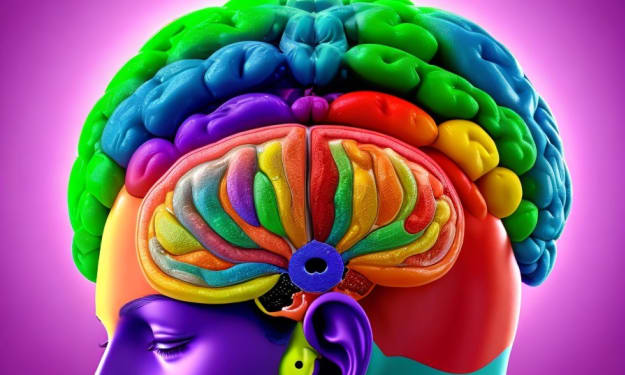The Body's Burning Engine: Unveiling the Mysteries of Metabolism
From Cellular Powerhouses to Daily Calorie Needs, Understanding How Your Body Makes and Manages Energy

The Body's Burning Engine: Unveiling the Mysteries of Metabolism
Our bodies are like intricate machines, constantly humming with activity. Every breath we take, every thought we process, every movement we make – all of these require energy. This energy, the fuel that keeps our internal systems running, is produced through a fascinating process called metabolism. This article delves into the world of metabolism, exploring the cellular powerhouses that generate energy, the factors influencing our metabolic rate, and the role it plays in maintaining overall health.
The Powerhouse Within: Mitochondria and the Energy Equation
Imagine tiny factories within your cells, dedicated solely to the production of energy. These factories are called mitochondria, and they are the unsung heroes of metabolism. Here's where the magic happens: through a series of complex chemical reactions, mitochondria break down the food we eat and convert it into a usable form of energy called adenosine triphosphate (ATP). This process requires oxygen, and the byproducts include carbon dioxide, water, and heat.
The equation for this cellular energy production can be simplified as follows:
Food + Oxygen → Energy (ATP) + Carbon Dioxide + Water + Heat
Measuring Our Metabolic Rate: Calories and Oxygen Consumption
So, how do we measure this crucial metabolic activity? There are two primary ways:
- Heat Production: Our bodies constantly generate heat. Measuring this heat production gives us an idea of how much energy is being expended. The unit used for heat production is the calorie (with a lowercase "c"). It's important to note that this scientific calorie is different from the Calorie (with a capital "C") you see on food labels. One Calorie is actually equal to 1,000 calories (1 kcal).
- Oxygen Use: Mitochondria require oxygen to break down food. By measuring the amount of oxygen we take in compared to the amount we exhale, scientists can estimate our metabolic rate. This method is presented as liters of oxygen consumed per minute.
The All-Influencing Factors: What Affects Your Metabolic Rate?
Several factors influence our metabolic rate, impacting how efficiently our bodies burn energy. These include:
- Hormones: Hormones like thyroid hormone play a significant role in regulating metabolism. An imbalance in these hormones can lead to a slower or faster metabolic rate.
- Body Temperature: Maintaining a healthy body temperature requires energy expenditure. Therefore, a fever can elevate your metabolic rate, while feeling cold can cause it to dip slightly.
- Body Composition: Muscle tissue burns more calories at rest compared to fat tissue. Individuals with a higher muscle mass tend to have a faster metabolism.
- Age: As we age, our muscle mass naturally decreases, leading to a gradual decline in metabolic rate.
- Genetics: Just like some people seem naturally gifted at athletics, others might have a genetic predisposition for a slightly higher or lower metabolic rate.
- Activity Level: This is perhaps the most impactful factor. Physical activity significantly increases our metabolic rate, not just during exercise but for up to 48 hours afterwards! Even activities like walking or taking the stairs can make a difference.
The Importance of Resting Metabolic Rate
Your resting metabolic rate (RMR), also known as basal metabolic rate (BMR), represents the minimum amount of energy your body needs to function at rest. This includes essential processes like breathing, circulation, and maintaining body temperature. Measuring RMR can provide valuable insights into your overall metabolic health and can be used by doctors to assess individual needs and potential health concerns.
Optimizing Your Engine: Keeping Your Metabolism Running Smoothly
Just like a well-maintained car runs efficiently, taking care of your body promotes a healthy metabolism. Here are some key strategies:
- Nourish Your Body: Providing your body with the right nutrients is crucial for optimal cellular function and efficient energy production. Focus on a balanced diet that includes whole foods, fruits, vegetables, and lean protein sources.
- Embrace Exercise: Regular physical activity is a powerful tool for boosting your metabolism. Incorporate a combination of cardio and strength training to build muscle mass and increase your body's calorie-burning potential.
- Prioritize Rest: Getting enough sleep is essential for overall health, including metabolism. When sleep-deprived, your body produces hormones that can disrupt metabolic processes.
Metabolism Myths Debunked
Many misconceptions surround metabolism, leading to unrealistic expectations and potentially unhealthy habits. Here are some common myths debunked:
Myth: Everyone has the same metabolic rate.
Reality: Several factors influence metabolic rate, including muscle mass, age, genetics, and activity level. While some people may seem to have a naturally fast metabolism, consistent healthy habits and exercise can significantly improve your metabolic efficiency for optimal energy use.
Myth: Spot reduction (burning fat in a specific area) is possible through targeted exercises.
Reality: Exercise helps with overall weight management and fat loss, but you cannot target specific areas for fat reduction. Specific exercises can strengthen and tone muscles in a particular area, but they won't solely burn fat there. A combination of a balanced diet and full-body exercise is most effective for fat loss.
Myth: Eating certain foods or supplements can "supercharge" your metabolism.
Reality: While some foods may have a slight thermogenic effect (causing a small calorie burn due to digestion), it's not a significant boost. Focusing on creating a sustainable, balanced dietary pattern with whole, unprocessed foods is more effective for long-term metabolic health. Additionally, unregulated supplements promising miraculous metabolic boosts can be ineffective or even harmful.
By debunking these common myths, you can gain a clearer understanding of how metabolism truly works and make informed choices about your diet and exercise routine. Remember, consistency and a holistic approach are key to optimizing your metabolic health and promoting a healthy, energized body.
The Gut-Brain Connection: A New Frontier in Metabolism
Recent research suggests a fascinating link between gut health and metabolism. The trillions of bacteria residing in our gut microbiome play a crucial role in nutrient absorption, digestion, and even hormone regulation. Studies have shown that an imbalanced gut microbiome can be linked to metabolic issues like insulin resistance and obesity. Maintaining a healthy gut through a diet rich in prebiotics and probiotics (foods that promote the growth of beneficial gut bacteria) may contribute to improved metabolic function.
In Conclusion: The Power Within
Understanding metabolism empowers you to make informed choices about your diet, exercise routine, and overall lifestyle. By fueling your body with the right nutrients, engaging in regular physical activity, and prioritizing healthy habits like sleep, you can optimize your metabolic function and keep your internal engine running smoothly. Remember, metabolism is a complex and individual process, so focus on creating sustainable practices that promote overall well-being and a healthy relationship with food and exercise.
About the Creator
suren arju
Hi there! I'm Suren, your startup guide. Entrepreneur, writer, dreamer - I share insights, tips & stories to fuel your startup journey. Ready to explore, learn & win together? Join me & let's redefine how we launch, learn & leap!
Enjoyed the story? Support the Creator.
Subscribe for free to receive all their stories in your feed. You could also pledge your support or give them a one-off tip, letting them know you appreciate their work.





Comments
There are no comments for this story
Be the first to respond and start the conversation.